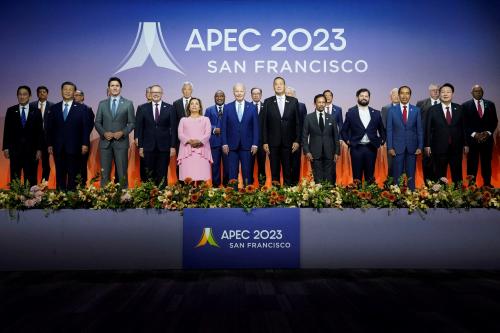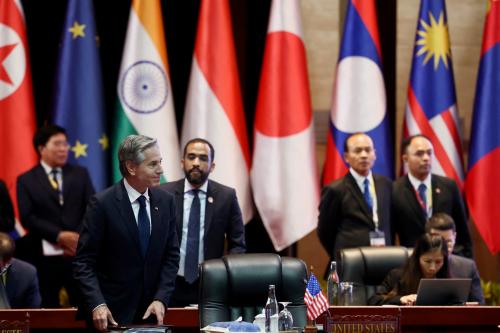2024
Access to water is considered one of the core issues currently being negotiated between Israel and the Palestinians. On October 1, the Saban Center for Middle East Policy at Brookings, together with EcoPeace/Friends of the Earth Middle East, hosted a discussion on the issue of water sharing and whether the sides could, or should, advance the issue ahead of other core areas of disagreement, such as borders, refugees, and Jerusalem. Panelists included Dr. Shaddad Attili, Palestinian National Authority minister of water; Ambassador Dr. Oded Eran, senior research fellow at the Institute of National Security Studies, Tel Aviv; and Adv. Gidon Bromberg, co-director of EcoPeace/Friends of the Earth Middle East. Tamara Cofman Wittes, director of the Saban Center, moderated the discussion.
The first speaker emphasized the urgency of the water situation in the region, describing the current system of management as broken. They explained that the provisions for sharing, established under Article 40 of the 1995 Interim Agreement on the West Bank and the Gaza Strip (Oslo II), were only supposed to last for five years and did not provide a comprehensive system for the long term. As a result, today Palestinians are not getting enough water, aquifers are becoming polluted and sewage goes untreated. The speaker closed by appealing for a third party presence in the water negotiations and called for an overhaul of the system that takes into account all shared waters in the region and prioritizes equity, efficiency and sustainability in any new management system. The second speaker agreed with the initial assessment of the urgency of the situation, and further explained that though funding exists for sewage treatment plants and increased water supply, due to the severe inefficiency of the Joint Water Committee, these projects are not being advanced. The speaker concluded by making two points: there cannot be a viable Palestinian state unless there is sufficient water, and the issue of water between Palestine and Israel is indeed solvable.
The third speaker underscored the need to take immediate action on water but approached the issue from a political perspective; Israel and Palestine must reach agreements on what they can today, without forgetting Jerusalem, or refugees, but they must not hold the issue of water and sanitation hostage. They explained that despite the challenges both sides face from their respective domestic political situations, solving the water issue can be a political gain for each, and cannot wait for a comprehensive peace agreement. The moderator inserted that the discussion pointed to the need for a paradigm shift in the peace negotiations and perhaps an ultimate abandonment of one comprehensive peace solution in favor of an issue-by-issue approach to peace. However, the moderator simultaneously questioned how water could be completely unpacked from the other issues, citing borders as an inextricably bound example. One speaker responded by arguing that coming together to deal with the issue of water would not preclude a comprehensive peace agreement, but would serve to build trust between both sides, encouraging cooperation and a final deal. Another speaker then added that perhaps it was a mistake to have designated water as a final status issue in the first place, and that water could be solved now at a low political cost for Israel and at high political gain for Palestine. Israel and Palestine would benefit together environmentally.
The speakers concluded by admitting that the domestic political situations in both Israel and Palestine were difficult, but perhaps if the U.S. took a more active role on water both could be brought to take action. All agreed that while immediate action on water is necessary, even if both sides came together a comprehensive deal would not necessarily follow. However, all agreed there was openness to dealing with the issue of water on both the Palestinian and Israeli sides and this should be capitalized on. The final remark, “Sharing water is not easy, but it’s not rocket science.” All agreed water is solvable.
Read An Agreement to Share Water Between the Israelis and Palestinians by EcoPeace/Friends of the Earth Middle East.
Agenda
-
October 1
-
Water in the Israeli-Palestinian Peace Process: Sharing Resources to Share the Future
2:00 pm - 3:30 pm
On October 1, the Saban Center for Middle East Policy at Brookings, together with EcoPeace/Friends of the Earth Middle East, hosted a discussion on the issue of water sharing and whether the sides could, or should, advance the issue ahead of other core areas of disagreement, such as borders, refugees and Jerusalem.
GBGidon Bromberg Co-Director - EcoPeace/Friends of the Earth Middle EastGBGidon Bromberg Co-Director - EcoPeace/Friends of the Earth Middle East
-

